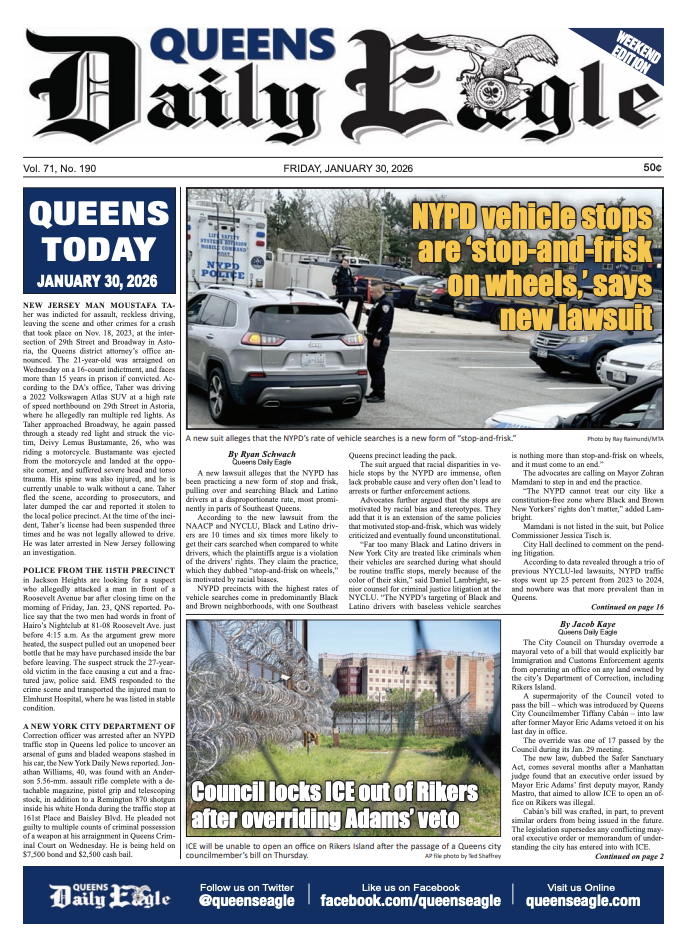One year after first Rikers COVID death, advocates push parole reform law
/Rikers Island AP Photo/Seth Wenig, File
By David Brand
More than 260 New York City inmates were locked up for non-criminal violations of their parole Sunday, one year after a man arrested for a minor parole infraction became the first Rikers detainee to die of COVID-19.
Michael Tyson, 53, died in custody on April 5, 2020, little more than a week after he was arrested and jailed for a technical parole violation — a consequence of infractions like returning home after curfew or missing a meeting with a parole officer. Tyson’s death came even after Gov. Andrew Cuomo signed an order to release people jailed for administrative violations of their parole, including nearly 700 people held on Rikers Island at the time.
A year later, there were 261 people detained for a technical parole violation on Rikers Island and in other city jails, according to daily data compiled by the Vera Institute. Some 291 people were behind bars for the non-criminal violations on March 31, the data shows. Advocates say their incarceration amid an ongoing pandemic illustrates the need to overhaul New York’s harsh parole laws.
“Thanks to New York’s antiquated and draconian parole laws, Mr. Tyson spent his final days confined to a cage, incarcerated on a non-criminal matter at Rikers Island,” said Tina Luongo, the head of the Legal Aid Society’s Criminal Defense Practice. “New York incarcerates people found to have committed technical parole violations more than any other state in the country, except for Illinois. It is time to end this practice in New York State.”
Luongo and justice reform advocates say the year anniversary of Tyson’s death should compel state lawmakers to pass a parole reform bill known as the Less Is More Act, which would limit the number of New Yorkers locked up for non-criminal parole violations.
Under state law, people arrested for technical violations are detained while they await a probable cause hearing, which must occur within 15 days of their arrest. Less Is More would mandate the hearing be held within 24 hours.
The measure would also establish an “earned time credit” that reduces a person’s parole sentence as they meet the conditions of their post-release supervision and limit the types of technical violations that fuel incarceration.
Prior to the pandemic, the number of people jailed for technical parole violations had surged in New York City, even as the overall jail population plummeted.
There were 5,735 people held in New York City jails April 4, according to Department of Correction data.
Three New York City district attorneys have come out in support of the Less Is More Act.
In an op-ed for the Daily News last year, Bronx DA Darcel Clark, Brooklyn DA Eric Gonzalez and Manhattan DA Cy Vance say current parole policy a “burdensome and punitive driver of mass incarceration.”
“With the danger people face in our state’s prisons and jails and the stark budget deficits facing state policymakers, passing Less Is More is more important now than ever,” the wrote.
Department of Correction and Community Supervision spokesperson Thomas Mailey said the agency has already implemented policies to reduce the number of people behind bars during the pandemic, leading to the cancellation of 791 low-level parole violations.
Mailey said incarceration is a “last resort” reserved for people who consistently commit technical parole violations. Parole officers must satisfy several protocols before issuing a technical parole warrant.
“Contrary to popular belief, technical parole violations are not issued for an individual missing curfew one time, failing to report to their parole officer one time, or missing a treatment appointment one time,” Mailey said. “The issuance of a technical parole violation is not a first resort, but rather a last, as these cases are the result of consistent and escalating violations of an individual’s parole.”
“Community Supervision staff, by directive, must pursue graduated responses and appropriate alternatives to incarceration before they can even recommend that a warrant be issued,” he added. “In cases where a technical parole violation is issued, the individual is guaranteed due process through a preliminary hearing, where probable cause must be established for the case to continue, and a final hearing where the individual is entitled to representation by an attorney. Ultimately, an Administrative Law Judge will make a final determination in the case, in accordance with established Parole Revocation Guidelines.”




